This content was shared by Mr. Pham Tuan Anh - Deputy Director of the Department of Teachers and Educational Managers ( Ministry of Education and Training ) at the conference to review and evaluate the results of implementing the general education program and textbooks for the period 2020-2025 held on October 17.
The teaching staff basically meets the quantity requirements, gradually overcoming the structural shortcomings.
Mr. Pham Tuan Anh said that to ensure enough teachers to implement the 2018 General Education Program, the Ministry of Education and Training has coordinated with the Ministry of Home Affairs to review and report to the Central Government to propose adding 65,980 teachers in the 2022-2026 period; and directing localities to manage the payroll, recruit and use teachers and educational management staff.
The Ministry of Education and Training also advised the Government and the Prime Minister to issue documents directing localities to recruit enough staff assigned by competent authorities and continue to recruit teachers when arranging the apparatus to implement the two-level government, solving difficulties in teacher shortage, and supporting educational institutions that have enough conditions to implement the 2018 General Education Program according to regulations.
Based on the guidance of the Ministry of Education and Training, localities have actively organized recruitment and achieved certain results. Specifically, from 2022 to 2025, localities have recruited 42,535 public general education teachers. Up to now, the teaching staff has basically met the quantity requirements, gradually overcoming the structural shortcomings. By the end of the 2024-2025 school year, the country has 884,764 general education teachers, an increase of 13,396 teachers compared to the school year when the 2018 General Education Program began to be implemented.
Along with developing the teaching staff, the Ministry of Education and Training focuses on building and promoting a network of teachers and key managers of general education institutions, which is the core force in implementing the 2018 General Education Program.
Currently, nationwide there are about 4,000 core general education management staff and nearly 30,000 core general education teachers in subjects and educational activities. This force is trained in depth, directly supporting general teachers, contributing to improving professional capacity and teaching quality at educational institutions.
Through online platforms and professional activities, the core network has played a good role in connecting, disseminating and providing professional guidance, supporting localities in implementing the 2018 General Education Program and Textbooks.
Regular, continuous and synchronous training and development
To improve the quality of teacher training to implement the 2018 General Education Program, Mr. Pham Tuan Anh said that the Ministry of Education and Training has advised the Government to submit to the National Assembly the 2019 Education Law, according to which the standard training level of primary and secondary school teachers is raised to university level.
Implementing the 2019 Law on Education, the Ministry of Education and Training advised and submitted to the Government to issue Decree No. 71/2020/ND-CP stipulating the roadmap for improving the training standards of preschool, primary and secondary school teachers.
The roadmap to raise the standard level is implemented in 10 years and divided into 2 phases (phase 1: 2020 - 2025, phase 2: 2026 - 2030).
Basically, the work of training to improve teachers' qualifications is of interest to management agencies at all levels, directed and receives high consensus from the teaching staff, so a large proportion of teachers proactively participate in studying to improve their qualifications.
By the end of the 2024-2025 school year, the rate of teachers and managers meeting the standards of the 2019 Education Law at the primary level is 92%, and at the secondary level is 95%. Compared to April 2020, the rate of teachers meeting the standards of the 2019 Education Law at the primary level increased by 29%, and at the secondary level increased by 16%.
With the motto of not allowing teachers to participate in teaching the 2018 general education program without being trained in the program, textbooks, teaching methods, testing and evaluation, the training, fostering and coaching of teachers and educational management staff is deployed regularly, continuously and synchronously, in the direction of standardization, modernization and meeting the practical requirements of the 2018 General Education Program.
Project 732 on training and fostering teachers to implement the 2018 General Education Program has been developed and implemented to build a team of teachers and educational managers with quality and reasonable structure, meeting the requirements of fundamental and comprehensive innovation in education and training.
In addition, the development and promulgation of regulations on professional standards for teachers and standards for principals of general education institutions have become effective tools to assess the actual capacity of teachers and managers. The assessment results according to standards are one of the bases for teachers and managers to proactively develop and propose plans and training content to develop weak and lacking capacities to meet the requirements of general education reform.
The Ministry of Education and Training has organized training for teachers and managers of core general education institutions through the ETEP Program, the RGEP Project and specialized training courses on teaching methods to develop students' qualities and capacities; innovation in testing and assessment; digital transformation in education; skills in applying information technology and artificial intelligence in teaching and school management...
On that basis, localities have coordinated with pedagogical schools to organize training for teachers and managers of general education institutions with the support of core teams so that teachers and managers of general education institutions have enough core competencies to implement the 2018 General Education Program.
The Ministry of Education and Training also pays attention to the annual regular training for teachers. The Ministry of Education and Training has researched and issued a Circular amending and supplementing the Circular on the Regulations on regular training to meet the requirements of general education reform; at the same time, it directs and guides localities to strengthen regular training in the direction of shifting from passive training to active training through self-study and self-training combined with professional group/team activities by school or school cluster with the guidance and support of core staff.
Since 2024, the Ministry of Education and Training has built a digital learning materials warehouse for training teachers and educational managers on the Training Management System (TEMIS). The TEMIS system of the Ministry of Education and Training and the online learning system (LMS) of pedagogical schools and service providers have been effectively exploited, creating a flexible learning environment. In particular, the training content focuses on improving digital capacity and soft skills in teaching and management.
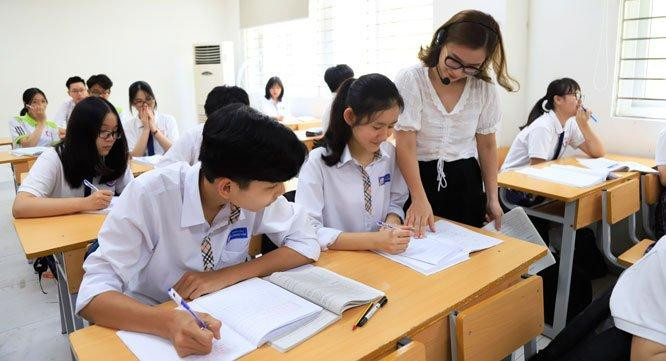
Increasingly improving the system of regimes and policies
The Ministry of Education and Training has advised and issued many new policies to care for and improve the material and spiritual life of the staff, typically:
Preferential allowance policy for teachers directly teaching in public general education institutions;
Seniority allowance, attraction allowance, long-term service allowance for teachers working in areas with especially difficult socio-economic conditions;
Adjusting the salary table and ranking of teachers' professional titles according to the provisions of the 2019 Education Law, linked to the standard training level, helps increase income and ensure fairness in career advancement.
Implement new regulations on teacher professional standards, principal standards, job position frameworks and job descriptions according to professional titles. Thereby, the management of the teaching staff is increasingly improved and effective, step by step meeting the increasingly high requirements on the quality of the staff.
The work of honoring and rewarding the teaching staff has been implemented seriously, promptly, publicly and to the right target; special attention has been paid to rewarding teachers who directly teach and have innovative and creative initiatives. These policies have contributed to encouraging professional spirit, helping the teaching staff feel secure in their work, constantly innovate and create, and successfully complete assigned tasks.
In particular, the promulgation of the Law on Teachers is an important turning point in Vietnam's education career, creating a solid legal corridor to honor and protect teachers, while opening up career development opportunities for the team in the period of fundamental and comprehensive innovation and international integration.
Difficulties and limitations
In addition to the remarkable results, the development of the team of teachers and educational managers still has some difficulties and limitations. Among them, there is a local shortage of teachers in some new subjects in the 2018 General Education Program, especially teachers of English, Information Technology, Music, and Fine Arts, especially in areas with difficult socio-economic conditions.
The quality of the staff is uneven. The digital transformation capacity, management capacity and ability to adapt to educational innovation of a part of teachers and managers are still limited.
Salary, allowance and treatment policies have not really created strong motivation; attracting and retaining high-quality human resources in the education sector still faces many difficulties.
The planning and development of the next generation of staff in some localities is not closely linked to practical needs and educational development orientation. Implementing the two-level urban government model, many localities are facing difficulties due to the lack of staff in charge of education at the commune level.
Planning and forecasting of teacher demand from strategic to local levels are not close and do not keep up with reality; population fluctuations and labor migration between regions are large and irregular.
The policy of streamlining 10% of staff in administrative and public service agencies in many localities is still being implemented mechanically. Some localities do not recruit all assigned teachers to implement the policy of streamlining 10% of staff.
5 key task groups and solutions
Based on the results achieved and the above difficulties and challenges, the Ministry of Education and Training identifies the following 5 key groups of tasks and solutions:
Firstly, continue to perfect the institutions and policies for developing the team of 5 groups of tasks and key solutions; advise on the development and promulgation of guiding documents, implementing the Law on Teachers, along with policies on salaries, preferential allowances, attracting and honoring teachers, ensuring consistency and consistency with current legal regulations. Urgently complete the draft Decree guiding the Law on Teachers in accordance with the Law on Education, Law on Higher Education, Law on Vocational Education.
Second, continue to review and evaluate the team to build and develop the team in the direction of standardization and modernization, linking evaluation with task performance results, innovative capacity in teaching and school management; at the same time, promote digital transformation in team management and development. Continue to review, arrange, and regulate preschool and general education teachers among educational institutions in the province to ensure reasonableness according to the direction of the Ministry of Education and Training.
Third, innovate training and fostering work in the direction of combining direct and online; strengthen the connection between pedagogical schools, fostering centers with technology enterprises to develop digital learning materials, AI-applied lecture libraries and digital learning materials warehouses on the Ministry's TEMIS system. Strengthen self-study and self-fostering of teachers with the support of digital technology and artificial intelligence; direct teacher training institutions to closely link training with practice, link output standards with teacher standards so that teachers are trained to meet standards, have practice and can immediately respond to teaching work according to the 2018 General Education Program.
Fourth, perfecting the working regime, job position framework and teacher policies, especially the salary and allowance policies for teachers according to Resolution No. 71-NQ/TW of the Politburo and the Law on Teachers to improve teachers' lives, contributing to the team's peace of mind and commitment to the teaching profession.
Continue to direct the development and approval of job position projects for each educational institution, as a basis for recruiting and using staff in accordance with regulations. Strengthen inspection, examination, and supervision of recruitment and use of teaching staff in localities; recommend to competent authorities to strictly handle localities that recruit and use staff in violation of regulations.
Fifth, strengthen decentralization associated with supervision and accountability; closely coordinate with localities in managing and using staff; complete and effectively exploit the education sector's database on difficulties and limitations to serve the work of planning, training, fostering and developing staff.
Source: https://giaoducthoidai.vn/5-nhom-nhiem-vu-trong-tam-tiep-tuc-phat-trien-doi-ngu-nha-giao-post753041.html








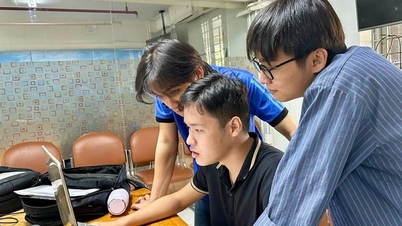





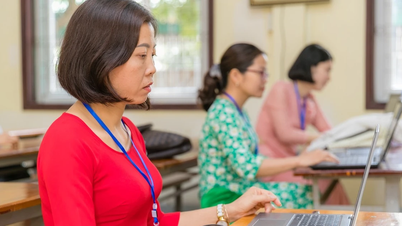
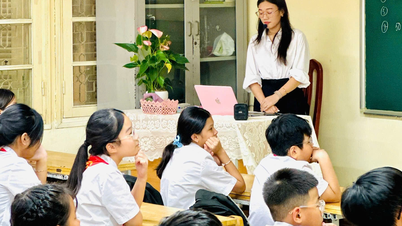




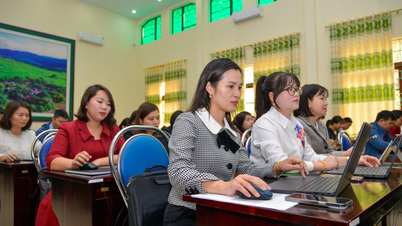

![[Video] 3,600 sets of textbooks will be provided to students in Thai Nguyen](https://vphoto.vietnam.vn/thumb/402x226/vietnam/resource/IMAGE/2025/10/19/1760859089900_sach-vo-cho-hoc-sinh-thai-nguyen-9346-jpg.webp)

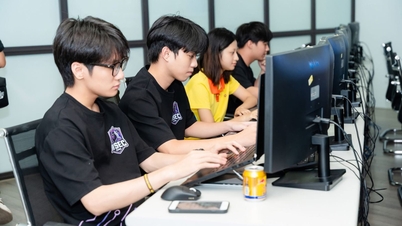




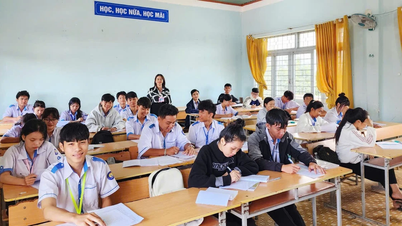

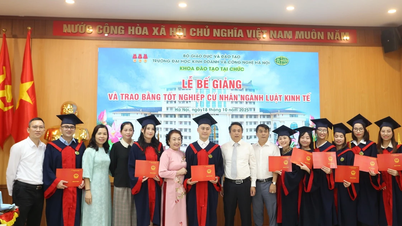
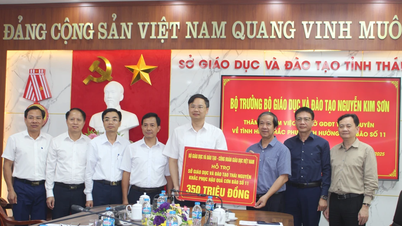
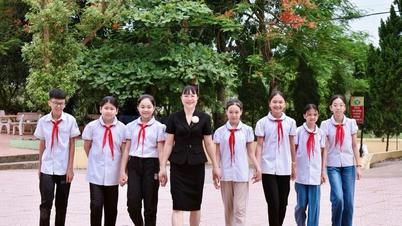
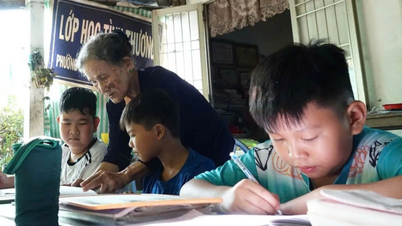



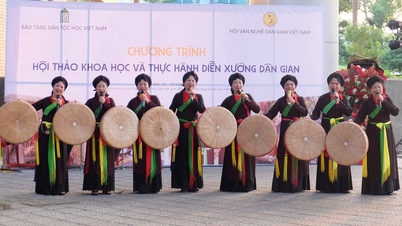










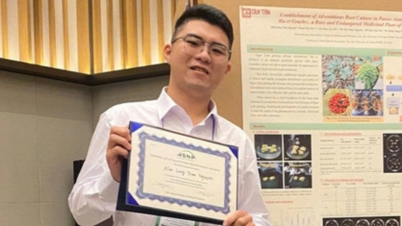


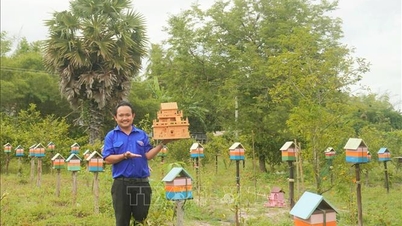



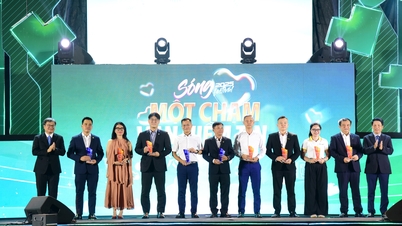












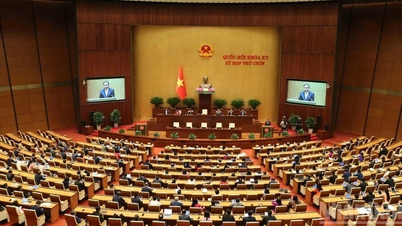
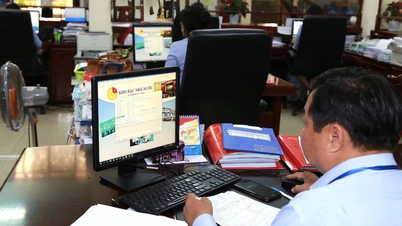
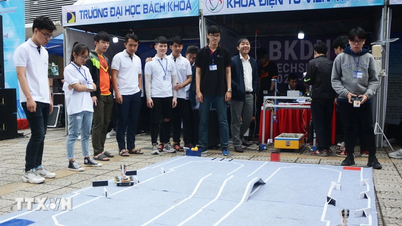

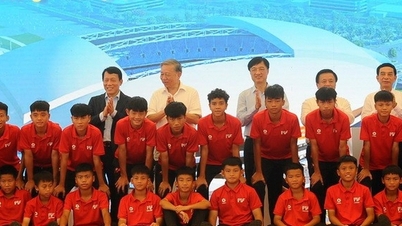




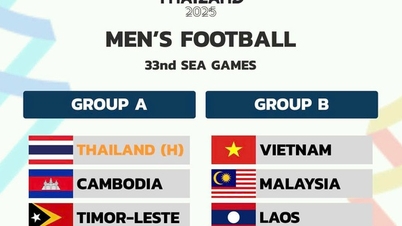

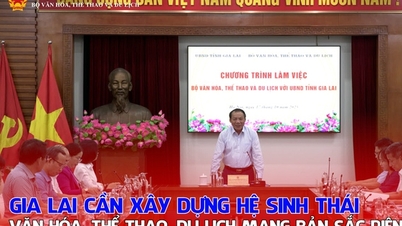
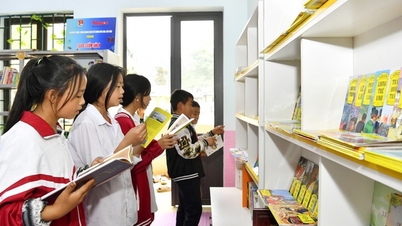



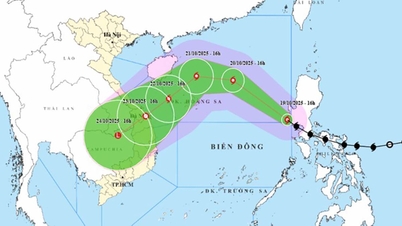

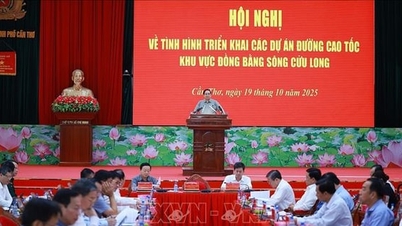





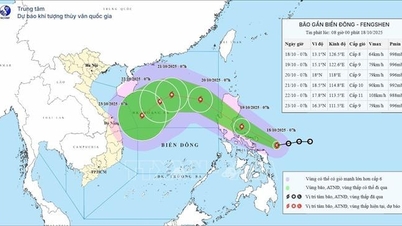












Comment (0)